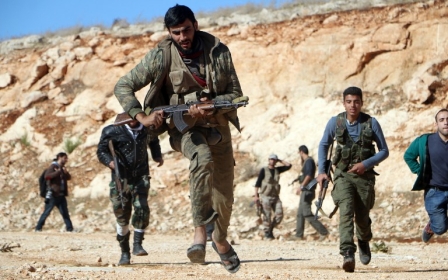Russia vows to keep fighting 'terrorism' in Syria, dashing Munich hopes

Russia will continue to give assistance to the Syrian armed forces to fight against "terrorists," Moscow said on Saturday.
"Russia is continuing a consistent line to provide assistance and help to the armed forces of Syria in their offensive actions against terrorists, against terrorist organisations," Kremlin spokesman Dmitry Peskov told journalists.
He said Russia's intervention will provide "stability in the fight with terrorism, to preserve the territorial integrity of the country [Syria] and the region".
The announcement comes despite an agreement in Munich on 12 February that there would be a "cessation of hostilities" within a week.
However, the International Syria Support Group talks, attended by US Secretary of State John Kerry and his Russian counterpart Sergei Lavrov, failed to agree to an end to Russian air strikes, which had been a key opposition demand.
The High Negotiations Committee (HNC), an umbrella group formed of political opposition bodies and rebel factions, said on Saturday that it would accept a temporary truce as outlined by world powers in Munich but that it would only do so if Syrian government foreign and its Russian and Iranian allies did so first.
"The rebel factions agreed in principle on the possibility of reaching a temporary ceasefire provided it is done with international mediation and with guarantees obliging Russia, Iran and their sectarian militias and mercenaries to stop fighting," HNC chief Riad Hijab said in a statement.
The statement, issued after a meeting of the HNC, said the opposition "wants to respond positively to international efforts to stop the Syrian bloodbath".
"But ... there will not be a truce unless fighting stops simultaneously on the part of all the belligerents, sieges are lifted, humanitarian aid is delivered to those in need, and prisoners, particularly women and children, are released," it said.
However, residents in Aleppo, which has been the target of a joint Russian-Syrian operation since last week, are not optimistic about the future.
"There is no longer any hope in anything," Thaer Mohammad, an Aleppo-based photographer, told Middle East Eye.
"The opposition's hopes rest on the deliverance of military aid both on the ground and aerially in addition to anti-aircraft missiles. More than 200 air strikes by Russia and the regime are released on a daily basis. The diplomatic talks are merely prolonging Assad's rule and his life. Through these political meetings, Russia is using them to make sure Assad stays in power.
"After they managed to let the forces of [Syrian President Bashar al] Assad advance into the northern and southern countryside of Aleppo, the Russians will definitely not leave the regime forces until they have Aleppo entirely under its control, or at the very least under siege," he added.
Syria's largest city, Aleppo has seen fierce fighting in recent weeks as Syrian army forces, backed by Russian air strikes, have made strides against rebel forces. Further to the north and east, Kurdish forces, which have also benefited from Russian air strikes, have also been advancing, largely against the Islamic State (IS) group.
However, they have also edged closer to Arab majority areas not under IS control, including the town of Azaz, close to the border with Turkey and which analysts say is a "red line" for Ankara.
To stem the advance, Turkey has begun shelling northern Syria, including positions held by the Kurdish-led Syrian Democratic Forces (SDF), which have been backed by US air strikes.
The Russians also claim that the Turks have been hitting Syrian government positions, and said that Kurdish forces were also launching attacks against the government. Moscow took the matter to the UN Security Council on Friday but failed to win support for a motion halting Turkey's military actions against Syria.
"We can only express regret that this draft resolution was rejected," Kremlin spokesman Dmitry Peskov told journalists on Saturday.
He said Moscow was "concerned at the growing tension at the Syrian-Turkish border. Russia considers such cross-border shelling that Turkey is carrying out as unacceptable".
Russia on Saturday said that it sent several fighter planes to reinforce its air base in Armenia near the border with Turkey.
Just one road into Aleppo left
According to aid groups, only one road into Aleppo now remains, with a desperate drive under way to try and get as many supplies into the city before it is cut off.
"The siege by regime forces is not yet a done deal," Assad al-Ashi, head of the NGO Baytna Syria, told AFP.
"But it is under fire from all sides so it is still dangerous. It can be cut off at any moment. Preparations are in full swing to get ready for a full siege."
"Syrian humanitarian organisations - there are around 100 on the ground - are stockpiling everything they can inside the city."
On Saturday, French President Francois Hollande expressed concern over the dire humanitarian situation in Aleppo, "where hundreds of thousands of civilians are threatened by a blockade by the [Syrian] regime supported by Russian air forces."
Hollande stated that while he remains committed to a political solution, international pressure must be exerted on Russia to stop its "unilateral support" for Assad.
"I do not want to exclude Russia from the solution," he told AFP. "I went myself to Moscow to tell Vladimir Putin, 'All of us have to work together to make this political transition' ... but I cannot accept that at the same time that people are negotiating they are bombing civilian populations."
Despite the ongoing fighting earlier in the week, Kerry told French TV that he remained committed to a political solution.
Stay informed with MEE's newsletters
Sign up to get the latest alerts, insights and analysis, starting with Turkey Unpacked
Middle East Eye delivers independent and unrivalled coverage and analysis of the Middle East, North Africa and beyond. To learn more about republishing this content and the associated fees, please fill out this form. More about MEE can be found here.






